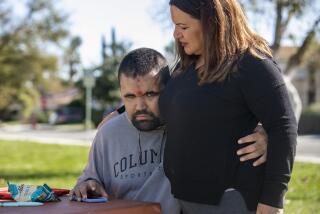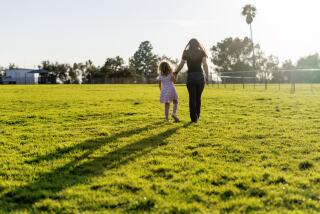Father Fights for Entry Into Group for Mothers
- Share via
NEW YORK — Joel Chaiken changes diapers, cleans house and is the chief caretaker of his toddler son. He does everything the other mothers in his Bronx neighborhood do. His problem is he’s not a mother.
That’s why he was banned from a local mothers-infant group.
Chaiken, 32, tried to join the Riverdale Neighborhood House support group last October when his son, Benjamin, was 7 months old.
“I thought basically it was a place to go during the day and meet new people; a place to find out about baby care--to find out real information, the kind your pediatrician can’t give you--a place for Benjamin to socialize and a place for support, to a certain extent.”
Instead, he found a closed door.
Chaiken is trying to pry it open by filing what is believed to be a precedent-setting discrimination suit. The state Division on Human Rights recently decided Chaiken’s case has merit and has ordered a public hearing.
“We found enough reason to believe he was treated differently because he was a man,” said Felicia Clavell of the state agency.
Some in Riverdale’s upper-middle-class neighborhood some 11 miles north of mid-town Manhattan say that’s the way it should be.
“There are mothers and there are dads, and he’s not a mother,” said Caryl Malka, 33, boiling the argument down to basics.
“I would feel very uncomfortable talking about personal things in front of him,” the two-time mother and former group member said. “It’s not a play group, it’s not just about the semantics of scheduling or diapering. . . . It’s women getting together and talking about very intimate things, and a man joining the group would really change that.”
Chaiken agrees, but he doesn’t think that’s negative.
“I think it would change for the better. Once they learn a real man could be understanding and compassionate, their own relationships might change.”
“Women don’t have a monopoly on emotional support and compassion toward others,” said Chaiken’s wife, Sue Ellen Dodell, who encouraged her husband to file the complaint.
Gender equality is important to the couple. That’s evident in the surname they chose for their child. It isn’t one name or the other, or a hyphenated version but an equal combination of the two: Chaidell.
It’s also evident in the Chaiken-Dodell-Chaidell family’s toy-strewn living room, littered with everything from a diapered baby doll to pickup trucks.
Chaiken said they decided “at conception” that he would give up his $37,000-a-year engineering job to care for their child. Dodell, 35, is a lawyer for the city.
His wife suggested that he join the group after seeing an advertisement in a local paper inviting “mothers with babies up to 1 year old” to come and “relax with a cup of coffee and enjoy each other’s company while they care for their babies.”
The ad said topics included “easing the transition into parenthood, new routines, infants’ sleeping and eating habits, talking to your pediatrician and choosing child care.”
Chaiken attended an open house and told social worker Etty Bar-Shai, who runs the group, that he was interested in joining. “She said it was full and that I should check again in January,” Chaiken said.
The center limits the group to 10 members; there were four in the group the semester Chaiken applied.
He said he continued asking questions about the group but “I got the feeling she was uncomfortable.”
The next day, Chaiken’s wife called to ask about joining and was told: “Sure there’s spots open, why don’t you come in for an interview.” When he confronted Bar-Shai, she told him the group was only for mothers.
As a woman, Dodell said: “I understand some may feel uncomfortable at first, but I think they should just give him a chance and see. I really think they could benefit from his perspective.”
But that, she said, is the emotional side of the issue.
Legally, she believes, the center is plain wrong. “It’s a place of public accommodation, and Joel should be permitted in the group, period.”
Riverdale Neighborhood House is a nonprofit center that receives city and state funding for a variety of educational and support programs.
The state human rights agency agrees and will argue Chaiken’s viewpoint at an as yet unscheduled hearing, Clavell said.
“They placed an ad and said: ‘Come one, come all, join us.’ But when Mr. Chaiken took them up on the offer, they said: ‘Oh no, you have to be a woman.’ When you invite the public, that includes men,” Clavell said.
Donald Cohn, a vice president at the center and an attorney at the high-powered, Park Avenue law firm of Webster & Sheffield, insists there was no discrimination.
“He took advantage of other programs at Riverdale House, and he was invited to participate in other programs,” Cohn said. “This one was just not appropriate for him.”
After the hearing, an administrative law judge will make a recommendation and state Commissioner of Human Rights Douglas White will issue a final order. The case may take longer than a year to resolve.
Chaiken realizes the decision will come too late to benefit Benjamin, who at 19 months old is already happily ensconced in a toddlers group, albeit not at Neighborhood House. Chaiken said he was allowed to join the toddler group at the center but was already committed to a different program.
“So why are we fighting on? We’re fighting on because this issue really has to be resolved,” Chaiken said. “It’s really to help future fathers who stay at home so they won’t have to go through this battle,” Dodell added.
Besides, they said, the decision may come in time for child No. 2.
More to Read
Sign up for Essential California
The most important California stories and recommendations in your inbox every morning.
You may occasionally receive promotional content from the Los Angeles Times.













